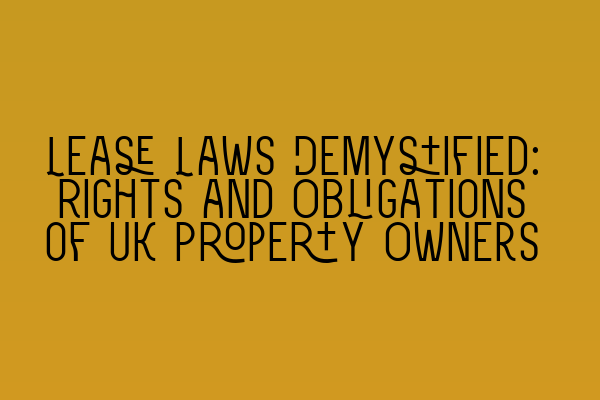Lease Laws Demystified: Rights and Obligations of UK Property Owners
As property owners in the UK, it is important to have a clear understanding of lease laws and the rights and obligations that come with owning property. Whether you are a landlord or a tenant, being aware of the legal framework surrounding leases will help you navigate the complexities of property ownership and ensure that your rights are protected. In this blog post, we will demystify lease laws and shed light on the key rights and obligations for UK property owners.
1. Lease Agreements: A lease agreement is a legally binding contract between the landlord and the tenant. It outlines the terms and conditions of the tenancy, including the duration, rent payment schedule, and any additional responsibilities of the parties involved. It is crucial for both landlords and tenants to have a written lease agreement in place to avoid disputes and protect their rights.
2. Duration of Lease: The lease agreement specifies the duration of the tenancy. In the UK, leases can be categorized into two main types: fixed-term leases and periodic leases. A fixed-term lease has a predetermined end date, while a periodic lease automatically renews for a specified period, such as monthly or yearly. Understanding the duration of your lease is important for planning and budgeting purposes.
3. Rent Payment: Rent payment is a fundamental aspect of the landlord-tenant relationship. The lease agreement should clearly state the amount of rent, the payment schedule, and any penalties for late payment. Landlords have the right to receive timely rent payments, while tenants have the obligation to pay rent on time to avoid facing consequences, such as eviction.
4. Maintenance and Repairs: The responsibility for maintenance and repairs is another essential aspect of lease laws. Landlords have a duty to ensure that the property is in a safe and habitable condition, while tenants are obliged to report any maintenance issues in a timely manner. It is recommended for both parties to document any maintenance requests and agreed-upon repairs to avoid disputes in the future.
5. Security Deposits: Many landlords in the UK require tenants to provide a security deposit at the beginning of the tenancy. This deposit serves as protection for the landlord in case of any damage or unpaid rent. Lease laws stipulate that landlords must place the security deposit in a government-approved tenancy deposit scheme and provide the tenant with information about the scheme within a specific timeframe. Tenants have the right to receive their deposit back at the end of the tenancy, less any deductions for damages or unpaid rent.
6. Right to Quiet Enjoyment: Both landlords and tenants have the right to quiet enjoyment of the property. This means that landlords cannot interfere with their tenants’ use and enjoyment of the property, while tenants must not cause disturbances or engage in activities that disrupt the peace and quiet of the surrounding environment. Understanding and respecting this right is essential for maintaining a harmonious landlord-tenant relationship.
7. Termination and Eviction: Lease laws outline the procedures and grounds for termination and eviction. Landlords have the right to terminate a tenancy under certain circumstances, such as non-payment of rent or breach of lease terms. Similarly, tenants can terminate the lease agreement with proper notice. However, eviction can only occur through a court order, and landlords must follow the appropriate legal process.
Understanding lease laws and the rights and obligations they entail is crucial for UK property owners. By being aware of these key aspects, you can protect your rights and ensure a transparent and fair landlord-tenant relationship.
For more information on contractual capacity and the rights and limitations associated with it, check out our related article: “Understanding Contractual Capacity: Rights and Limitations.”
If you want to test your knowledge of contract law, take a look at our interactive SQE mock tests for Contract Law: “Interactive SQE Mock Tests for Contract Law: Test Your Knowledge.”
For expert insights and guidance on SQE Contract Law, don’t miss out on our upcoming SQE Contract Law webinars: “Join Our SQE Contract Law Webinars: Expert Insights and Guidance.”
Additionally, if you want a deeper understanding of contractual capacity and the legal competence of contracting parties, our article “Contractual Capacity: Understanding Legal Competence in Contracting Parties” provides valuable insights.
Lastly, keep up-to-date with the latest changes in contract law by reading our analysis of recent reforms: “Contract Law Reforms: An Analysis of Recent Changes.”
At SQE Property Law & Land Law, we are here to support you in navigating the world of lease laws and providing you with expert legal advice. Contact us today to ensure your rights as a UK property owner are protected.
